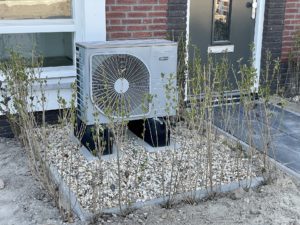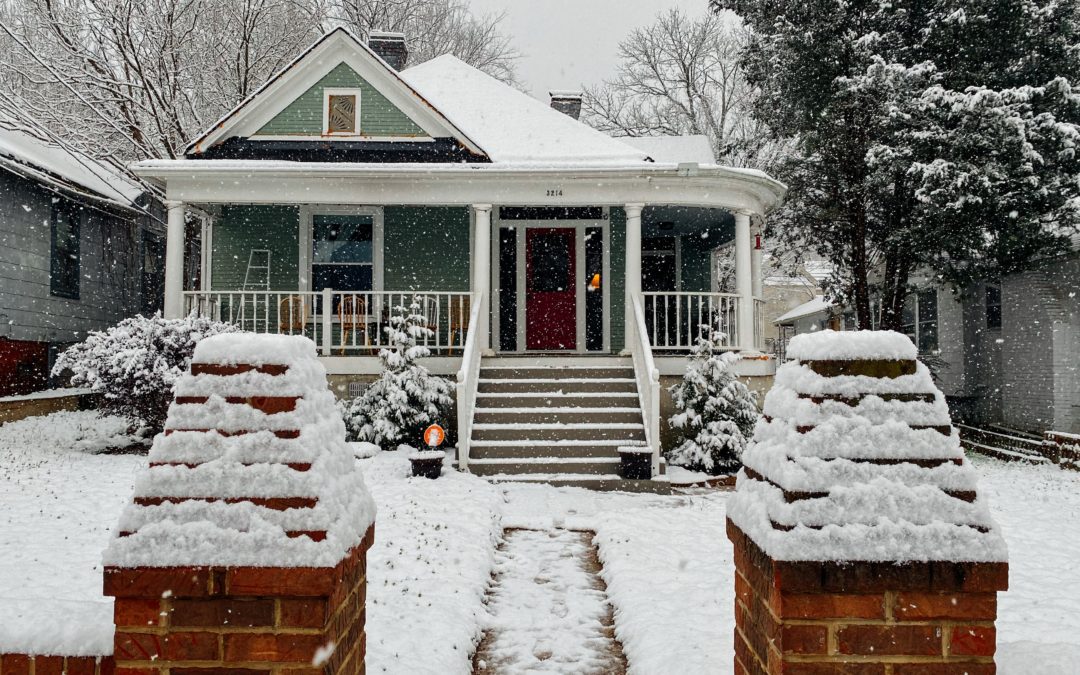Heat pumps have been gaining popularity as a reliable and cost-effective option for home heating in Maine. However, there’s still a common conception that heat pumps can’t keep up with cold weather, so heat pumps in Maine are inefficient. There’s something to this claim, especially when looking at older heat pumps, but it seems this is a case where technology has outpaced general wisdom. We thought we’d take the chance to dig into and explore this issue for our fellow Mainers who are considering getting a heat pump.
How Do Heat Pumps Work?
Something we get asked all the time is, “how does a heat pump work?” The specific engineering involved is fairly complex, but here is a less technical overview so you can get a general sense of how heat pumps work.
A heat pump is a type of HVAC (heating, ventilation, and air conditioning) system that uses electricity to transfer heat from one place to another. It consists of two main parts: an outdoor unit, similar to a central air conditioner, and an indoor unit, called an air handler, which is installed on a wall, ceiling, or floor area. The two units are connected by a line set that carries a special fluid, called a refrigerant, between them.
When you want to heat your home, the heat pump uses electricity to run the compressor, which pressurizes the refrigerant and makes it absorb heat from the outside air, even when it’s cold outside. The refrigerant then carries that heat inside your home, where it’s released into the air by the indoor unit. This process warms the air in your home and makes it feel comfortable even on the coldest of winter days.
When you want to cool your home, the process is reversed. The compressor pressurizes the refrigerant and makes it absorb heat from the indoor air, then releases that heat outside through the outdoor unit. This process cools the air in your home and makes it feel comfortable even on the hottest of summer days.
Though this may sound more complicated than simply generating heat with electric resistance or burning heating oil, heat pumps are a highly efficient and low-carbon alternative to traditional heating and cooling equipment. This is because it actually takes less energy to move heat from outside to inside than it is to generate heat directly. In fact, if you use a green source of electricity, such as solar or wind power, you can cut your carbon footprint from heating and cooling down tremendously.
Why Do I Keep Hearing That Heat Pumps Aren’t Good When It’s Cold Out?
When the temperature outside drops, it becomes harder for the heat pump to extract heat from the air. This means the heat pump has to work harder to maintain the same level of warmth inside the home. As a result, the heat pump may not be as efficient at providing heat in extremely cold weather. This is known as the “coefficient of performance” or COP of the heat pump, which decreases as the outdoor temperature decreases. This decrease in COP means less heat is being produced for the amount of electricity used, making it less efficient.
For example, a heat pump that delivers four units of heat for every unit of electricity at 50°F may deliver only two units of heat for every unit of electricity at temperatures below zero. This is why, if you live in an area with prolonged periods of extremely cold temperatures like Maine, a heat pump may not be able to keep up with the heating demands in the most extreme weather, and a secondary backup heating system may be needed to maintain the desired comfort level.
However, as the efficiency of heat pumps continues to improve (most modern units are at least 400% efficient relative to direct electric heating under normal conditions), even in very cold temperatures, they’re still more efficient than traditional electric heat. Unless you experience a truly severe and long cold snap (such as temperatures under -20°F for several days), your heat pump should be able to keep your house warm.
It’s important to note that not all heat pumps are created equal, and some are designed to work better in colder temperatures than others. It’s worth checking the minimum operating temperature of the heat pump before purchase to determine if the heat pump is suitable for your area.
So, despite the loss of efficiency at lower temperatures, heat pumps are an excellent option for those who want to save money on heating and cooling costs, desire a greener alternative, or have an older HVAC system and are looking to upgrade.
What Drives the Popularity of Heat Pumps In Maine?
With Maine’s stated goal to install 100,000 heat pumps by 2025 and tens of thousands already installed in homes and businesses, it’s clear that heat pumps are becoming the go-to choice for heating in Maine. This is partly because heat pumps are genuinely an excellent, efficient way to heat and cool homes and businesses, even in Maine’s climate.

While heat pumps face some challenges in winter, they’re undisputed kings of cooling in summer.
However, this is also thanks to an aggressive rebate program that can save home and business owners hundreds to thousands of dollars on their heat pump systems. Efficiency Maine, the state’s energy efficiency program, has been offering rebates for residential, low-income, and commercial customers to help encourage the adoption of heat pumps. With the help of Efficiency Maine’s rebates and resources, you can find the right contractor and ensure proper installation.
The Efficiency Maine program also conducts research to bolster the argument for whole-home heat pump systems, as opposed to just installing one heat pump and using fossil fuel sources as a backup. In fact, recent research by Efficiency Maine shows that replacing entire home heating systems with heat pumps can be cost-effective and comfortable, even in Maine’s notoriously cold winters. Feedback from pilot program participants has been overwhelmingly positive, with homeowners praising the evenness of heat and saying it kept them warm even as temperatures dropped well below zero.
What makes heat pumps so effective in Maine, a state known for its cold winters? Well, even with our cold weather, heat pumps can save homeowners up to 50% on energy costs over the course of the year, making them an attractive option for those looking to save money on heating and cooling. Additionally, heat pumps can operate well down to -22°F outdoor temperatures, making them a realistic primary heating source even in Maine’s colder climate.
Should I Get a Heat Pump in Maine? What You Need to Consider
If you look at the data and the facts, it’s clear that heat pumps are a reliable and cost-effective option for home heating in Maine. Heat pumps offer a greener alternative to traditional heating and cooling equipment and can save homeowners money on energy costs. With Maine’s goal to go carbon neutral set for 2045, heat pumps are playing a crucial role in achieving this timeline. If you’re considering upgrading your home’s heating system, heat pumps are worth considering. However, there are certain considerations to keep in mind when using heat pumps in Maine.
Consider Extreme Cold
One of the main considerations is cold temperature performance. Heat pumps work harder to keep up as temperatures drop outside, making them less efficient. For example, a system that delivers four units of heat for every unit of electricity at 50°F may deliver only two units of heat for every unit of electricity at temperatures below zero. This means that if the temperature drops low enough (usually around -20°F), the system may turn off completely. To ensure comfort during the chilliest nights, it’s recommended to have a secondary backup heating system or a heat pump designed to work under these tough conditions.
Consider Fresh Air
Another consideration is air movement. Heat pumps do not bring fresh air into the home but recirculate air. Air blowing directly on you can increase comfort during the cooling season but can be uncomfortable during the heating season. Check Efficiency Maine’s heat pump user tips for recommended fan settings for the heating and cooling season.
Consider Heat Distribution
Heat distribution is another consideration. Heat pumps rely on air movement to distribute heat. This can make it hard to get heat around corners and into dead-end spaces. Getting additional mini-splits can make a huge difference with this issue, making every room in your home comfortable year-round. It’s important to check Efficiency Maine’s heat pump user tips and installation considerations to learn how to get the most from a heat pump.
Lastly, it’s important to keep in mind interactions with the primary heating system. If you’re thinking about using a heat pump along with another heating system, make sure to locate the heat pump where it won’t conflict with the other system’s thermostat. This kind of conflict could result in one system preventing the other from running. This is not a risk if you are using a heat pump as your only heating system.
Choosing Heat Pumps For Maine
Heat pumps are a reliable and cost-effective option for home heating in Maine. They offer a greener alternative to traditional heating and cooling equipment and can save homeowners money on energy costs. With the state’s goal to go carbon neutral by 2045, heat pumps play a crucial role in achieving this goal.
Choosing The Right Maine Heat Pump Installer
If you’re considering a heat pump for your home or business in Maine, All Solar Energy Solutions may be the best fit for you. We provide a full range of heat pump installation and maintenance services in addition to all kinds of solar panel energy systems. Please feel free to reach out to us for a free quote and a consultation about your unique home.

